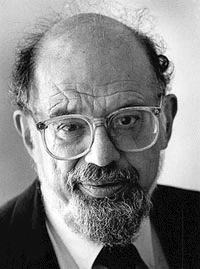-
|

|
Chapter 10: Late Twentieth Century and Postmodernism
Allen Ginsberg
1926-1997
|
©
Paul Reuben
September 10, 2019
E-Mail
|
Page Links: |
Primary
Works |
Selected
Bibliography 1980-Present
| Study
Questions |
MLA
Style
Citation of this Web Page
|
Site
Links: | Chap. 10: Index | Alphabetical
List
| Table
Of Contents
| Home
Page
|

Source: EIZIE
"Where are we going,
Walt
Whitman? The doors close in an
hour. Which way does your beard point tonight?"
Allen Ginsberg, "A
Supermarket in California," 1956
With his death today
(April
5, 1997), we have lost probably the most provocative poetic voice of
the second half of the twentieth century. Ginsberg was a satirist, a
humorist, and an idealist; he cared passionately for these United
States. Like the sweeping vision, lyricism, and embrace of his chief
inspiration, Walt Whitman, Ginsberg attacked the formalism of the
post WWII conventions to create works which gave voice to the
disenfranchised, the ostracized, and the suppressed. A modern
transcendentalist, Ginsberg, in his life and his writings,
personified non-conformity, self-reliance, and an endless search for
the meaning and purpose of life.
Primary
Works
Howl and
Other Poems, 1956; Kaddish and Other Poems 1958-60, 1961; Reality
Sandwiches: 1953-1960, 1963; Wichita Verses Sutra, 1967; Planet
News, 1968; Iron Horse, 1972; The Fall of America:
Poems of These States, 1965-1971, 1973 (National Book Award); Mind
Breaths: Poems, 1972-1977; Collected Poems 1947-1980, 1984;
White Shroud, Poems 1980-1985, 1986; On the Poetry of
Allen Ginsberg (ed. Lewis Hyde), 1984; Cosmopolitan Greetings:
Poems 1986-1992, 1995 ( Pulitzer Prize Finalist).
Death &
Fame: Last Poems 1993-1997. Eds. Bob Rosenthal, Peter Hale, and
Bill Morgan. NY: HarperFlamingo, 1999.
The Yage
Letters: Redux. Harris, Oliver. ed. San Francisco: City Lights,
2006. (Burroughs, William S. and Ginsberg, Allen)
The Book of
Martyrdom and Artifice: First Journals and Poems, 1937-1952.
Liebermann-Plimpton, Juanita and Morgan, Bill. eds. Cambridge, MA: Da
Capo, 2006.
The Letters of
Allen Ginsberg. Morgan, Bill. ed. NY: Da Capo, 2008.
Jack Kerouac
and Allen Ginsberg: The Letters. Morgan, Bill. ed. NY: Viking; 2010.
Selected
Bibliography 1980-Present
Allen, Donald. ed.
Composed on the Tongue: Allen Ginsberg. 1980.
Bartlett, Lee. The
Beats:
essays in criticism. Jefferson, NC: McFarland, 1981. PS228.B6
B48
Davies, Catherine A.
Whitman's Queer Children: America's Homosexual Epics. NY:
Continuum, 2012.
Kraus, Michelle P. Allen
Ginsberg, An Annotated Bibliography 1969-1977. Metuchen, N.J.:
Scarecrow Press, 1980. Z8342.5 .K7.
Mead-Brewer,
Katherine C.
The Trickster in Ginsberg: A Critical Reading. Jefferson, NC:
McFarland; 2013.
Miles, Barry. Allen
Ginsberg: A Biography. 1989.
Morgan, Bill, and
Allen
Ginsberg. The Response to Allen Ginsberg, 1926-1994: A
Bibliography of Secondary Sources. Westport: Greenwood,
1998.
Morgan, Bill. Beat
Atlas:
A State by State Guide to the Beat Generation in America. San
Francisco, CA: City Lights, 2011.
Raskin, Jonah. American
Scream: Allen Ginsberg's Howl and the Making of the Beat
Generation. Berkeley: U of California P, 2004.
Schumacher, Michael.
Dharma Lion: a critical biography of Allen Ginsberg. New York:
St. Martin's Press, 1992. PS3513 .I74 Z86 1992
Shreiber, Maeera. Singing
in a Strange Land: A Jewish American Poetics. Stanford: Stanford
UP, 2007.
Sterritt, David.
Screening the Beats: Media Culture and the Beat Sensibility.
Carbondale: Southern Illinois UP, 2004.
Weaver, Helen. The
Awakener: A Memoir of Kerouac and the Fifties. San Francisco. CA:
City Lights, 2009.
Whitmer, Peter O.
Aquarius revisited: seven who created the sixties counterculture
that changed America: William Burroughs, Allen Ginsberg, Ken Kesey,
Timothy Leary, Norman Mailer, Tom Robbins, Hunter S. Thompson.
NY: Macmillan, 1987. E169.12 .W48 1987
Study
Questions
1. Allen Ginsberg's
use of
long lines was a deliberate experiment for him, the "long clanky
statement" that permits "not the way you would say it, a thought, but
the way you would think it-i.e., we think rapidly in visual images as
well as words, and if each successive thought were transcribed in its
confusion . . . you get a slightly different prosody than
if you were talking slowly." Read Howl and other anthologized
poems, paying particular attention to Ginsberg's use of the long
line.
MLA
Style
Citation of this Web Page
Reuben,
Paul P. "Chapter 10: Allen Ginsberg." PAL: Perspectives in American
Literature- A Research and Reference Guide. URL:
http://www.paulreuben.website/pal/chap10/ginsberg.html (provide page
date or date of your login).
| Top |

